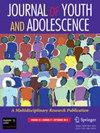青少年被父母准确理解的首选策略和推断策略。
IF 3.6
1区 心理学
Q1 PSYCHOLOGY, DEVELOPMENTAL
引用次数: 0
摘要
亲密关系中的感知理解已被证明与关系满意度和幸福感呈正相关。然而,人们对促进这种观念的首选手段知之甚少。本研究调查了青少年倾向于父母用来理解其情感的策略,以及这些偏好是否与青少年推断父母使用的策略和父母报告使用的策略相匹配。此外,该研究还调查了这些偏好、推断和实际(报告的)策略是否与青少年的感知理解、生活满意度和与父母的关系质量相关。样本包括150对青少年(Mage = 16.26;SD = 1.01, 57.3%为女性)和父母一方(84%为母亲,Mage = 47.94, SD = 6.51)。结果显示,青少年大多更喜欢父母尝试接受他们的观点(观点接受),而他们的父母报告使用直接沟通,即询问他们的感受(观点获得)。感知理解、生活满意度和关系质量不能由父母报告的行为预测,而是与青少年首选和推断的观点获取呈正相关,与青少年首选的观点获取负相关。本文章由计算机程序翻译,如有差异,请以英文原文为准。
Adolescents' Preferred and Inferred Strategies for Being Accurately Understood by Their Parents.
Perceived understanding in close relationships has been shown to positively correlate with relationship satisfaction and well-being. Less is known, however, about the preferred means for promoting such perceptions. The current study investigated the strategies adolescents prefer their parents use for understanding their feelings, and whether these preferences match the strategies adolescents infer their parents use and the strategies the parents report using. In addition, the study examined whether these preferences, inferences, and actual (reported) strategies correlate with the adolescents' perceived understanding, life satisfaction, and relationship quality with their parents. The sample included 150 pairs of adolescents (Mage = 16.26; SD = 1.01, 57.3% female) and one of their parents (84% mothers, Mage = 47.94, SD = 6.51). The results revealed that adolescents mostly preferred their parents try to take their perspective (perspective-taking), whereas their parents reported using direct communication, that is, asking them about their feelings (perspective-getting). Perceived understanding, life satisfaction, and relationship quality were not predicted by the parent's reported behavior but rather were positively associated with the adolescent's preferred and inferred perspective-getting and negatively associated with the adolescent's preferred perspective-taking.
求助全文
通过发布文献求助,成功后即可免费获取论文全文。
去求助
来源期刊

Journal of Youth and Adolescence
PSYCHOLOGY, DEVELOPMENTAL-
CiteScore
8.20
自引率
6.10%
发文量
155
期刊介绍:
Journal of Youth and Adolescence provides a single, high-level medium of communication for psychologists, psychiatrists, biologists, criminologists, educators, and researchers in many other allied disciplines who address the subject of youth and adolescence. The journal publishes quantitative analyses, theoretical papers, and comprehensive review articles. The journal especially welcomes empirically rigorous papers that take policy implications seriously. Research need not have been designed to address policy needs, but manuscripts must address implications for the manner society formally (e.g., through laws, policies or regulations) or informally (e.g., through parents, peers, and social institutions) responds to the period of youth and adolescence.
 求助内容:
求助内容: 应助结果提醒方式:
应助结果提醒方式:


